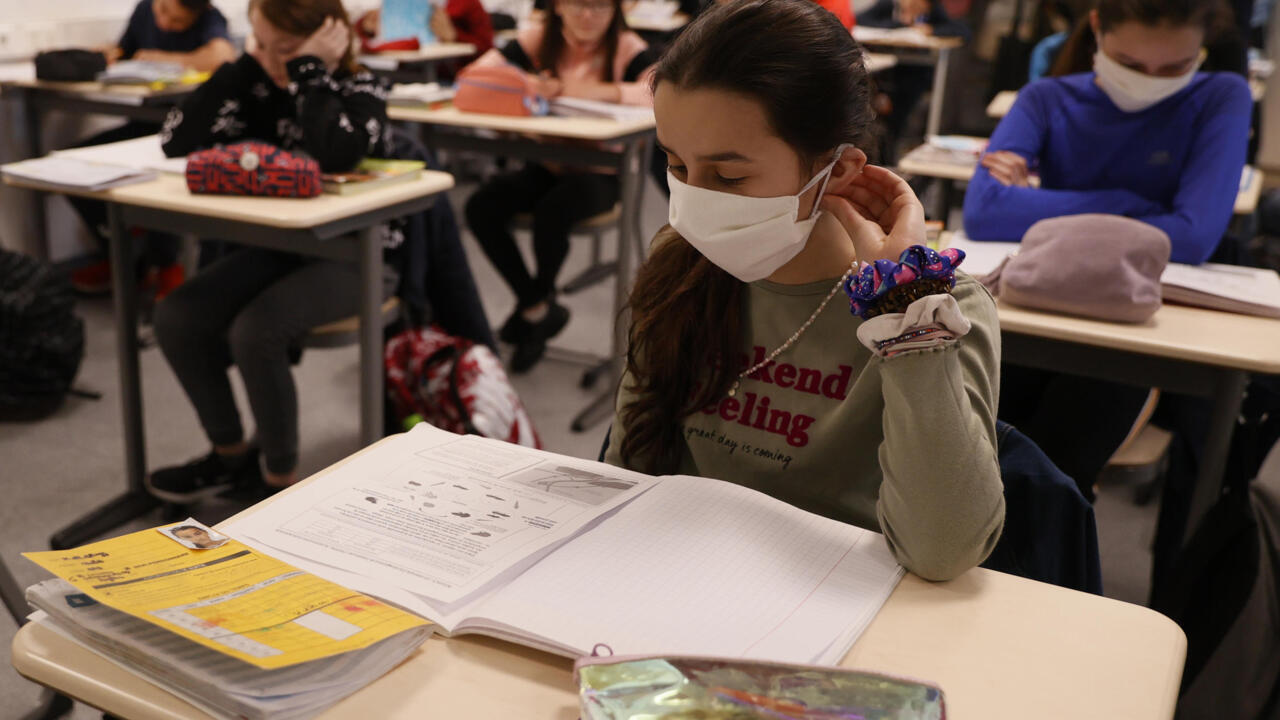Tuesday, September 1, some 12.4 million students return to class.
If everyone is preparing for a school year in the shadow of the coronavirus and under the threat of a tightening of health regulations, the National Education is doing everything, for the moment, so that the start of the school year is "as normal as possible", according to statements by Minister Jean-Michel Blanquer, Monday, August 31, on the sidelines of a visit to Mayenne.
And all students must be present at the call.
"School is compulsory", recalled the minister.
Jean-Michel Blanquer wants to be reassuring, believing that the health protocol "is simple and clear" and that "it is not intended in its main principles to vary".
It is "one of the strictest in Europe, it allows us to have the most normal possible return", according to him.
With some exceptions.
What are the re-entry conditions?
Review of the main points of the health protocol.
Who should wear a mask?
With the schoolbag, the pencil case and the notebooks, the mask is the new accessory on the back-to-school supplies list for 2020: it is compulsory for teachers and children from the age of 11.
For teachers, the mask is provided by the National Education.
For children, the masks are the responsibility of the families, except in certain departments.
The City of Paris, for example, will provide two fabric masks to each student on the first day of the school year.
Barrier gestures are also required in establishments: social distancing, disinfection of classes and limitation of mixing.
"Hydroalcoholic gel bottles are placed in different rooms of the establishment, at the entrance, in the amphitheater, the canteen etc. .. and we are asked to strictly respect hygiene measures", confirms to France 24 Justine Brax, visual communication teacher in the professional high school Alfred Costes, in Bobigny (93), which made its pre-entry on August 31.
Canteen, recreation and extracurricular activities will they be provided normally?
Students over 11 years old will have to wear their mask during recess.
In the canteen, they will also have to carry it on their travels and can only remove it at the table.
The ministry recommends adapting “the time slots and the number of services” so as to “limit flows and occupancy density”.
For students under 11, recess will likely be staggered to limit the number of children in the yard.
The limitation of pupil mixing should be “sought as far as possible”.
Extracurricular services normally resume with normal hours.
Can we accompany my child to class?
Traditionally, parents of kindergarten students accompany their child to class.
Without categorically ruling out this practice, Jean-Michel Blanquer recalled that the "principle is to avoid contact between adults as much as possible".
He called on school principals to "show pragmatism".
Some schools will therefore allow parents to enter the classroom, undoubtedly following some rules of distance.
What to do in case of fever?
"We were asked to stay at home at the slightest symptom," says Justine Brax.
To this high school teacher, as to the others, it was indeed notified, Monday, the day of the return of teachers, that one should not come to school in case of fever or the appearance of symptoms.
They will also need to be tested.
If a child is symptomatic, tests will be done.
This in order to "go up the chain of contamination to take isolation measures", said the ministry.
The goal is to be able to “react within 48 hours whenever symptoms are reported” to test everyone who has been in contact.
Are there any risks that classes or schools will close?
Three possible scenarios are possible during the year, depending on the evolution of the epidemic.
If the health situation does not deteriorate, all the students will be able to stay in class and the establishments will remain open.
If the epidemic evolves in the geographical area of the establishment, education will be given part-time, face-to-face and remote.
If the epidemic affects the establishment, the closure of one or more classes, or even the entire school, could be considered.
The minister specified that the closures will be decided "on a case-by-case basis, according to a strict protocol in the hands of the health authorities with the prefects and rectors".
He does not rule out the possibility of certain closures: "In the coming weeks, this kind of thing will inevitably happen so we should not consider it a failure or a problem. We should consider that as the necessary corollary for this policy. that we want students back to school ".
What pedagogical continuity?
The confinement was not the same for all.
From the start of the school year, assessments will be set up in the classes of CP, CE1, 6e and sec.
These evaluations will be accompanied by personalized support mechanisms.
"Our school has set up a post-Covid evaluation to take stock of the period, both on the positive and negative aspects: we will see what worked in distance education and how we will organize the catch-up for those which disappeared from circulation in March, "said Justine Brax.
A particular challenge in vocational high schools, where many lessons could not be kept at bay.
"In vocational high school, there are many workshops in small groups with pupils who are there to learn a trade: for example, you cannot learn to use a printing machine or do desktop publishing [Publication computer-assisted] remotely because the students are not equipped at home ", continues the professor.
"Our challenge this year is both to provide new lessons, but also to come back to what has not been acquired. We will juggle the two."
With AFP
The summary of the week
France 24 invites you to come back to the news that marked the week
I subscribe
Take international news everywhere with you!
Download the France 24 application
google-play-badge_FR

